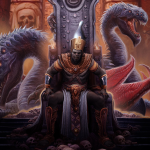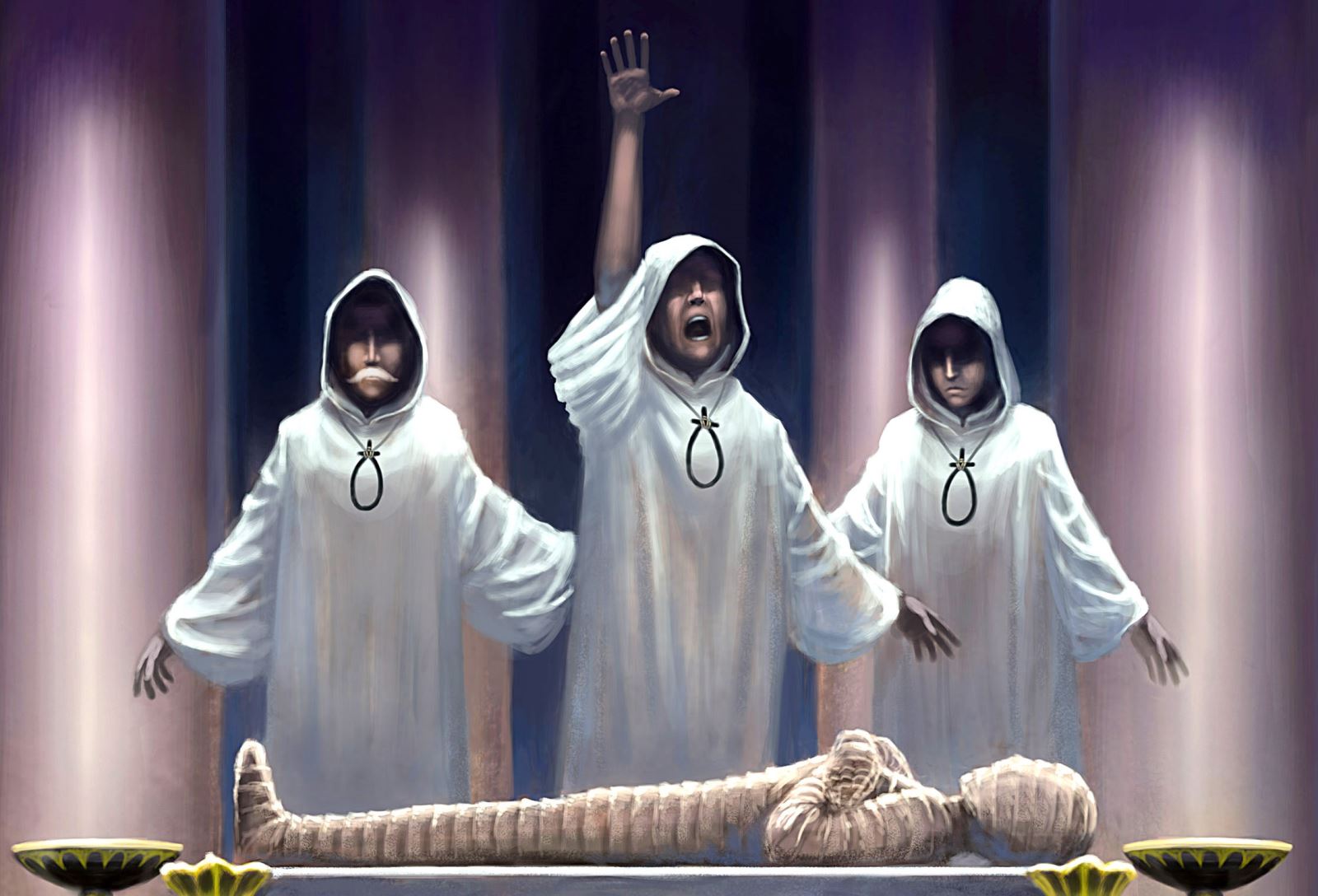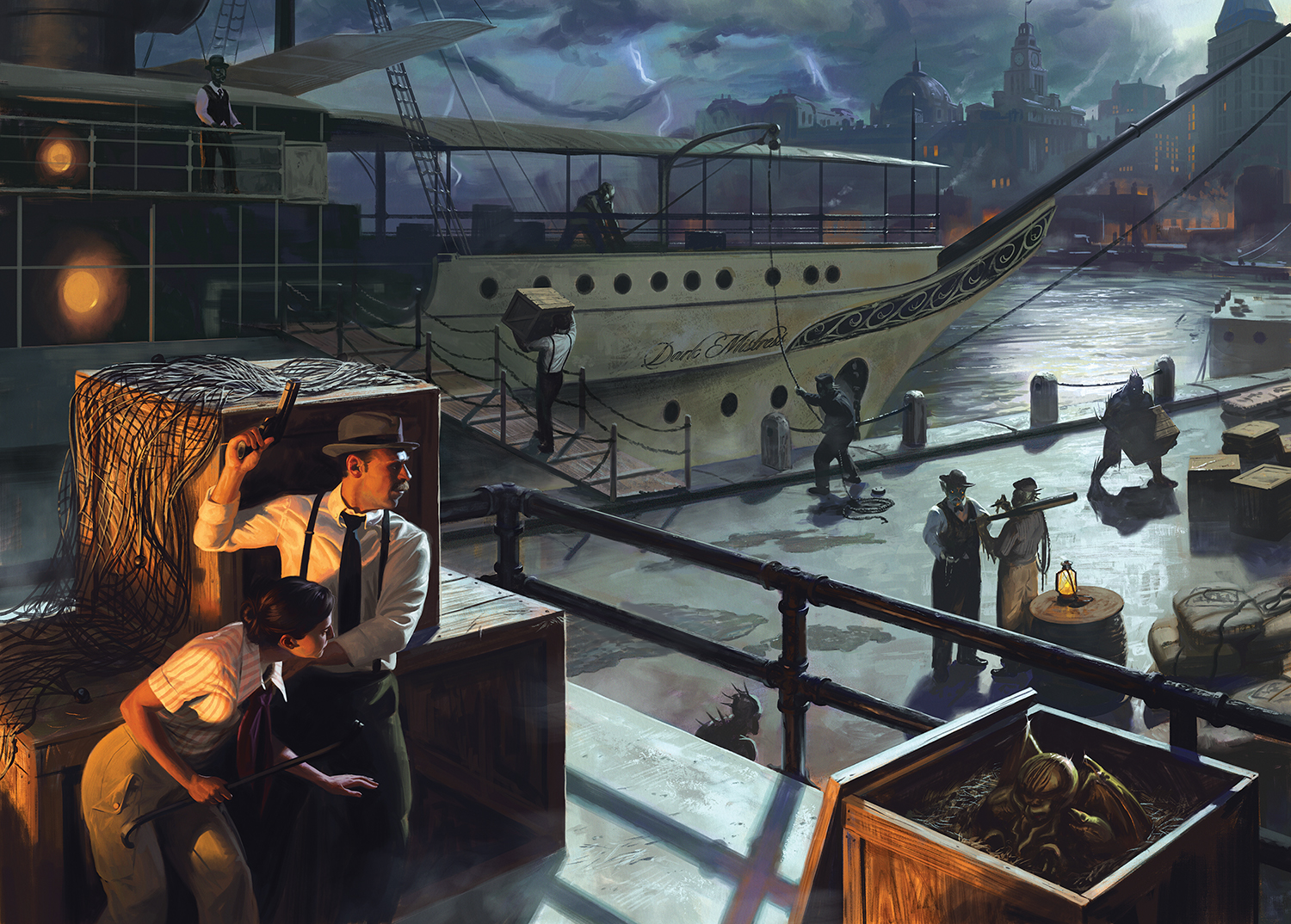
‘It’s become almost a rite of passage for many GMs’
This feature was first published in February 2018’s issue of Tabletop Gaming magazine to mark the then-upcoming release of the new edition of Masks of Nyarlathotep. We’re now republishing it online in full as originally printed in tribute to Masks co-creator Larry DiTillio, who sadly passed away in March 2019.
Your friend is dead, the murder victim of a sinister cult after he suddenly sent you a telegram calling for help investigating the mysterious fate of the Carlyle Expedition. Finding the answers will take you around the world and risk the loss of your life and sanity – and the total destruction of humanity should you fail.
This is the opening to Masks of Nyarlathotep, the epic multi-part Call of Cthulhu campaign first released more than three decades ago in 1984 and universally considered one of the pinnacles of roleplaying storytelling since, collecting the 1996 award for Best Adventure from the Academy of Adventure Gaming Arts & Design, the precursor to the Origins Awards. Even Psycho author – and friend of H.P. Lovecraft – Robert Bloch was a fan.
Set in 1925 and starring Lovecraft’s shadowy deity Nyarlathotep, Masks was a revelation upon release due to its sweeping tale that saw players globetrot from America and England to Egypt, Kenya, Australia and China, and the non-linear approach used to unfurl its shocking narrative across several interlinked adventures.
Masks’ narrative hook of an expedition missing in Africa was inspired, unexpectedly, by Kenyan politician and founding father Jomo Kenyatta, who had been researched by roleplaying author Larry DiTillio while writing a script for children’s television show Against the Odds. DiTillio was later approached by Call of Cthulhu publisher Chaosium to pitch a scenario for its horror RPG and, despite his initial reluctance, eventually came around on the idea of putting together a story. With Kenyatta’s life still fresh in his mind, DiTillio began to write a scenario featuring a group of explorers that had disappeared in Kenya. The multi-country setting grew out of a need to justify how players’ investigators would end up in the African nation, with DiTillio throwing in extra locations based on some of Lovecraft’s stories.
Eight months later, the 400-page manuscript submitted by DiTillio was expanded further by the late Lynn Willis, who added detailed background on each of the countries visited along the journey.
“Larry understood that Chaosium wanted something different to the Call of Cthulhu books they were putting out at the time – many dealt with sinister New England locales and small hidden-away villages,” Call of Cthulhu line editor Mike Mason reflects today. “So his idea about something set in Africa was the spark that ignited the campaign. What’s more, Lynn was looking to show that Call of Cthulhu could be played in different ways, so Larry’s pulp-inspired story approach to Masks fitted the bill.”
Chaosium had previously put out two longer-form Call of Cthulhu campaigns, Shadows of Yog-Sothoth and Fungi from Yuggoth, but Masks was something else. Its sprawling, connected tale blew apart the largely episodic nature of its predecessors, handing even more control of the narrative to the whims and decisions of players – including actions that could have consequences in later chapters – and allowing a single plotline to build to a thrilling finale over dozens of hours. After the opening section in New York, players could head to any of Masks’ global locations and find their own path through the story.
“One reason why Masks worked so well was that the story was cooked up by a single person who was able to translate that story across differing locales,” Mason suggests. “Often campaigns are written piecemeal, with different writers putting together their scenarios in isolation. Once the parts are complete, someone must gather the scenarios and mesh them together to form the campaign. If this isn’t done carefully, the campaign can feel unconnected and the logic absent. Thus, ensuring different writers are working closely together throughout the entire process is essential; allowing them to contribute ideas to each other’s scenarios means the whole is tighter and better formed. Masks avoided these pitfalls because Larry and Lynn worked closely together.”
In fact, the original draft of Masks was so ambitious in scale that its creators ultimately had to leave out an entire sixth chapter set in Australia inspired by Lovecraft’s The Shadow Out of Time due to the size and cost of the book. The missing scenario would finally hit the table in 1987’s Terra Australis supplement, before being reunited with the full campaign in 1996’s The Complete Masks of Nyarlathotep. From its initial sold-out run through its equally popular reprints, Masks has remained a consistent hit for generations of roleplayers.
“Masks fired up people’s imaginations and its pulp ethic of keeping the pace and story moving hit a positive chord with players around the world,” Mason says. “It’s an epic story that creates epic gameplay – which means great and memorable scenes around the gaming table that players love to recount. It’s become almost a rite of passage for many game masters to run the campaign.”

This year sees Masks return to terrorise a new wave of players, coming to Call of Cthulhu’s seventh edition in an expanded form.
It’s the first major update to the campaign since the 30th anniversary edition hardback, which introduced new artwork but left things otherwise largely unchanged. This time around, Mason and co-authors Lynne Hardy, Paul Fricker and Scott Dorward have revisited and refreshed the entire campaign chapter by chapter, with Mason promising the team added “cool ideas to strengthen the campaign’s narrative” alongside updating its rules to support the seventh edition.
Chief among the changes is a brand new chapter set in Peru, which serves as a prologue to the main story and lends greater depth to the character of Jackson Elias, whose research kicks off the core mystery.
With props playing a key role in the story, the new edition marks the first time Masks will be printed in full colour, complete with new art, cartography and player handouts – some of which have appeared in the French and Spanish versions of the book in the past.
For the first time, the campaign can also be played in Pulp Cthulhu – the rollicking Call of Cthulhu spin-off that toughens up investigators and allows for a more action-heavy tone. Alternative scenes and options for the RPG are included alongside their Call of Cthulhu counterparts, while a set of appendices act as a reference for the campaign’s various spells, items and more – which should make running the notoriously complex story easier for game masters, referred to in-game as ‘Keepers’.
“We’ve also strengthened the clue trail to ensure there are no ‘clue bottlenecks’ while also making it easier for the Keeper to keep a handle on the various moving parts of the campaign,” Mason adds. “In terms of running, we feel it’s the most user-friendly version of the campaign to date, with plenty of advice and guidance throughout.”
The revised campaign should be a little easier-going on players, too. Masks is infamous for chewing up investigators throughout the course of its brutal story, with a staggering rate of mortality and insanity, and the need to regularly introduce new characters, which can be intimidating for players today.
“It was a constant churn of characters, which meant the players often became detached and unconnected to their characters,” admits Mason. “The end result being that many groups failed to ever finish the campaign, abandoning it when they just got fed up with another of their characters dying in an random and uninspired manner.”
To improve the life expectancy of investigators on the trail of Nyarlathotep, the new Masks tones down many of the campaign’s most lethal scenes and encounters, particularly reducing the punishment inflicted on players for taking a wrong path and other relatively minor mishaps. Don’t expect an easy ride, though.
“We didn’t declaw it fully,” Mason quickly adds. “Certain climactic scenes remain, where the threat of character death is a possibility. Also, by including Pulp Cthulhu optional scenes we were able to up the ante from time to time, as Pulp Cthulhu heroes are more durable and tougher than regular Call of Cthulhu investigators – so, depending on your play style preference, you have the option to ramp up certain encounters for pulp play.
“Certainly, in whatever style you end up playing, Masks remains a tough campaign – but, now, the concept of deaths by a thousand cuts is diminished and put into the hands of the Keeper. Which, all in all, we hope that the majority of player groups get to enjoy the entire campaign and reach its epic ending.”
It’s not just Masks’ gameplay that needed bringing into the 21st century. The original campaign suffered from outmoded treatment of gender and race – even in the context of its historical setting.
“Most of the original characters were male, which didn’t really reflect society or history,” says Mason. “We’ve refitted some of the characters to better reflect reality, as well as adding further details on the different locales, providing more in-depth background for the settings and the period in which the campaign takes place.
“We also addressed ethnic portrayals to ensure balance and fair representation. We researched the various settings and historical portrayals to ensure these are as correct as possible, tweaking and rewriting as necessary to ensure accurate and sympathetic portrays of the differing communities and locales. I personally spent a great deal of time looking up old maps from 1925 of various places to ensure authenticity in terms of location and travel.”
Chaosium had already been planning to bring back Masks in an updated form for Call of Cthulhu when another way to tell the story anew arose.
Mega-studio Fantasy Flight contacted the publisher with the idea to bring the campaign to Eldritch Horror, a descendant of Call of Cthulhu board game spin-off Arkham Horror – making the proposed project a reunion of sorts.
The board game expansion takes its cues from the roleplaying campaign’s groundbreaking structure, adding a campaign mode that tracks the group’s progress over multiple chapters as their actions dictate the ultimate fate of the world. Players get to explore their characters’ histories further, too, with personal stories developing their background and ties to the action. It doesn’t quite have the depth of an RPG – but it’s not a bad way to get a taste of the story in just an evening or two, either.
“The storyline is more abridged, as there just isn’t the room to tell all the levels of the story,” Mason says. “Of course, this also means the game is quicker to play while providing a fun experience. In Call of Cthulhu, the experience is different: the full story can be played out, including sidetracks and red herrings. It’s a deeper, often more personal experience. If you’ve been playing through the full Masks campaign, then its climax will be that much more rewarding. That’s not to say the board game version isn’t rewarding too, it’s just a different experience and still lots of fun.
“While the experience can never be so freeform and unrestricted as in the Call of Cthulhu version of Masks, the board game version hits other highs – for one, you can play the entire campaign in a single night! Thus, we see both working in unison. You can enjoy many sessions of play and deeper levels of understanding with the Call of Cthulhu campaign, while also enjoying an entirely different style of play and take on the campaign with Eldritch Horror in a simpler and easy to pick up manner.
“We expect many people may first encounter Masks through the Fantasy Flight version, who will then be turned onto the mystery of the Carlyle Expedition and wish to play through the full campaign using Call of Cthulhu. Why enjoy only one version when you can play both? You might fail at one but achieve success in the other!”
MATT JARVIS
Illustrations by Jake Murray, Wayne Miller, Caleb Cleveland, Victor Leza, Jonathan Wyke, Eric Lofgren

Call of Cthulhu line editor Mike Mason recalls his own introduction to Masks and offers some tips to those taking on the adventure for the first time
“My first encounter was as a player back in 1985, soon after its release. My school friends and I gathered each Friday evening to play and muddle our way through the campaign’s twists and turns. We didn’t fare very well, I’m afraid, and came to a quite a messy end – meaning we didn’t save the world! I remember that my first investigator in the game ended up being sacrificed to the Outer Gods in a rather unspeakable way. Despite our poor attempt to uncover the mystery of the Carlyle Expedition, we had great fun and still talk about those game sessions today.
“There are so many elements in Masks that I like. But, for me, the London chapter has always been close to my heart. It has one of the best villains in it, and also includes two ‘sidetrack’ mini scenarios unconnected with the core campaign, which allow the players to let off some steam and chase a red herring or two. There are also some fabulous setpieces in the campaign that are grand in scale and turn Call of Cthulhu’s usual cultist gatherings on their head. Oh, and one more cool thing is the range of non-player characters, each with their own motives and agendas, who are just fun to play as the Keeper. As I say, there really are too many just downright cool things in the campaign!
“If you are planning to run the campaign, read the whole thing through first. It’s key to understand the interdependencies and motivations of the main characters, all of which are helpfully summarised in the campaign. Prep game sessions by making some bullet-point notes of the key information, encounters, and characters the players should find in that session – as there are often a number of moving parts going on, having these aid memories can be a real help to ensure you don’t forget stuff.
“Also, don’t fuss about the little stuff. There’s no need to worry overly about the investigators’ finances or how they sometimes get from A to B in terms of travel; the core of Call of Cthulhu gaming isn’t about accounting. Keep things apace and on track. Of course, all of this is covered in more detail in the actual campaign guidance, so be sure to pay attention to the advice given, which stems from years of experience running Call of Cthulhu and this campaign in particular.”
.jpg)
This article originally appeared in the February 2018 issue of Tabletop Gaming. Pick up the latest issue of the UK’s fastest-growing gaming magazine in print or digital here – or subscribe to make sure you never miss another issue.